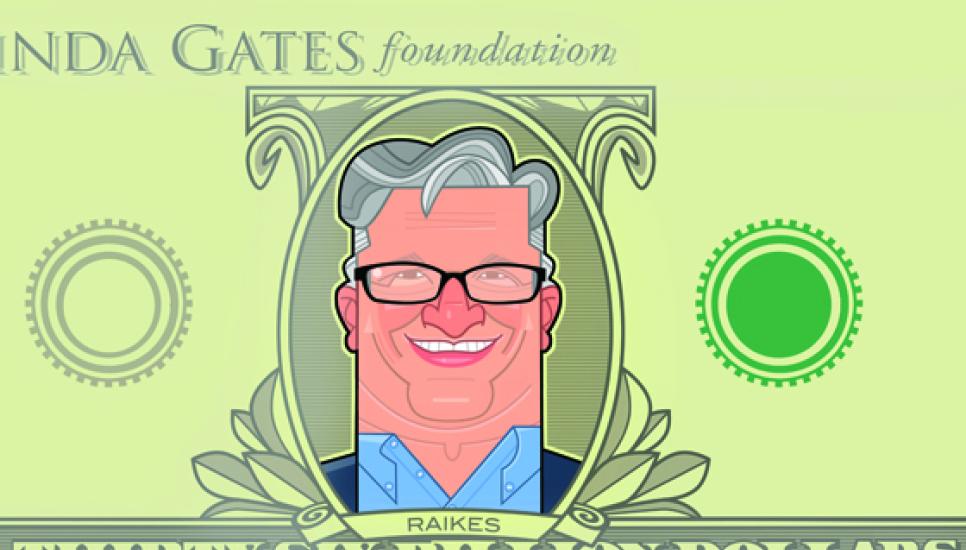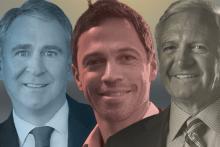The world's biggest giver

Ho ho ho: and down the chimney he comes, spreading happiness with his gifts wherever he goes. With the contents of his sack valued at $36 billion (€27.15 billion) – all of which must be given away sooner or later – Jeff Raikes might seem like everyone’s idea of the modern-day Santa Claus.
But the guy in the grey rather than the red suit is not keen to be seen in this way. Indeed the image makes him wince slightly. “Please don’t think of me as a Father Christmas with a $36 billion sack,” pleads the chief executive of the Bill & Melinda Gates Foundation. “It’s not how we work. We practice catalytic philanthropy. We use a clear sense of strategy to maximise our impact. We are a catalyst, not a handout. We make evidence-based investment.” Hardly the language or modus operandi of St Nicholas.
But Raikes’s meaning here is clear – it’s not that he’s a killjoy wanting to suck the warm, fuzzy feeling that charitable giving imbues. Philanthropy the Gates way amounts to far more than simply lobbing cash at the poor and disadvantaged to assuage guilt at great wealth and make the giver feel good about themself. Philanthropy is a very serious business and Raikes simply believes that it is done best with the head, rather than the heart. And there are few clearer users of the head, plus the brain inside it, than the uber-geek founder of Microsoft and Raikes’s boss, Bill Gates.
The 1,000-person strong foundation that Raikes runs is, by some margin, the richest private philanthropic enterprise in the world. Although founded in 1994, the seriously big bequests were made by Bill Jr in 2000 (Bill Sr, aged 86, is a trustee and co-chair) and have since been added to by Gates’s friend and long-time bridge partner Warren Buffett. It has very bold ambitions to match the depth of its pockets: saving many millions of lives by eradicating killer diseases such as malaria and HIV; revolutionising agricultural production in Africa by increasing crop yields; plus waging war on poverty and hunger. The foundation already provides 68% of the total private giving to health causes on the planet.
There is an old adage that if you think making loads of money in business is tricky, then try the philanthropy game where you can really get into difficult waters. It’s something the foundation has experienced – it causes considerable controversy, even at a time when government development budgets are being cut all over the globe as growth has stalled. In January, a BBC Radio 4 documentary about the foundation was titled Inside Fortress Bill. Its accusers call the organisation secretive and divisive. The typical argument from sceptical members of the third sector is that because of its size, the foundation’s agenda shapes not only other charities but also international development organisations and governments. The international medical outfit Médecins sans Frontières, also known as Doctors without Borders, is wary of the perfidious Americans. Even the well-respected medical journal The Lancet has called some of the Gates Foundation’s priorities “whimsical”. With levels of gratitude like this, the guys and girls from Seattle might be forgiven for wondering sometimes why they bother.
But Raikes doesn’t come across as guarded or indeed even defensive when confronted with such allegations. He’s open, highly intelligent, articulate and clearly cares very deeply about what he does. Many say he’s a far more effective and diplomatic frontman than Bill himself. “There is a lot of bad philanthropy,” says Raikes. “It is so easy to do it badly. Indeed perpetually badly. It doesn’t have a market system with its ongoing monitoring that leads to continuous improvement. So, it is harder to give money away than to make it. You have to be far cleverer to make it work because the skills that you use to build a business are not necessarily the same qualities you require to be involved in impactful philanthropy.”
What Raikes wants is consistent evidence that the bottom line – the welfare of the poor – is being bettered. He is right to be concerned about the droves of western aid workers and non-government organisations that swarm around developing countries in their Toyota Land Cruisers, often doing more harm than good to those they seek to assist. He and Gates like evidence-based projects, which is why they are so keen to fund vaccines to eradicate malaria for example. The way he has gone about learning how to do it is by using the same analytical skills he employed during his career in Microsoft.
Raikes started working at Microsoft in 1981. He was a year and a half out of Stanford University and toiling away in a low level marketing job at Apple when he was poached by its great tech rival. “I was 23,” he says. “And decided to leave Apple for Microsoft, despite the offer to work on the first Macintosh. Both companies were tiny but I decided software was where I really wanted to be.” It wasn’t long before Steve Jobs heard Raikes was defecting to the arch enemy and got on the phone. “[The call] involved plenty of yelling,” says Raikes. “He tried to convince me Microsoft was about to go bust.”
Raikes stayed at Microsoft – living for the first few months in a dilapidated house in Seattle with Steve Ballmer – and watched it grow from a minnow of fewer than 100 employees to a 91,000-strong global Leviathan.
He stood alone within Microsoft as the only individual able, according to Forbes magazine, to “challenge Gates’s brilliance and Ballmer’s bluster”. A rare profile of Raikes that appeared in Forbes was headlined “The Humbler One”. He was for many years the stable, grounded counterbalance to this supremely intense duo. Raikes’s exterior profile was far lower than Gates or Ballmer and led him, rather unfairly, to be called the de facto number three that nobody had ever heard of. He was never that enthusiastic, either, about being called the guy behind “the dead cash cow” as some technology commentators sneeringly called Microsoft Office.
He had been involved in Office in its earliest stages, but was later moved to become the overall boss of worldwide sales and marketing. When Office stumbled slightly in the late 1990s, Gates and Ballmer brought him back to the world of Word, Excel, Outlook and PowerPoint to get it motoring again. “I told them I could double Office in size within 10 years and we did it in seven,” he says. “When I left it was a $17-$18 billion business, used by 750 million around the world.” Around half the users don’t even pay for it, but he adds: “I’m proud to have created one of the great brands of all time.”
Much of his success is down to his thorough nature and the fact that he doesn’t mess around. When Gates suggested his Office boss should learn everything about his rival at WordPerfect, Raikes memorised the names and birthdays of the man’s six children. This mentality came from his farming background in rural Nebraska. “I grew up on a family farm in Nebraska, which taught me my values: work ethic, caring for living things – livestock and crops – responsibility and a passion for honesty. Contracts were a handshake. My brother took it over but he was killed in a farming accident in 2009. So, I’m now also a gentleman farmer.” He remains a beef fan and insists that his Caesar salad comes with steak rather than chicken.
Raikes now travels a huge amount, mainly in the developing world and works especially closely with Melinda Gates, who is the organisation’s public face. “Melinda is my best collaborative partner. The impact of the foundation over the next few decades will be phenomenal – in beating malaria and polio, and improving agriculture.” The goal is to help 150 million of the world’s poorest families lift themselves out of extreme poverty by 2025.
It is Melinda who is credited with being more interested in the “softer” and less technological side of development. She has, for example, become very involved in a drive to reduce infant mortality in India. Mothers are taught and encouraged to begin feeding newborn babies earlier – in some communities the mother and child are separated at birth. This sort of education programme is a whole lot less precise than the lab-based hunt for a vaccine, but the work is seen as equally important.
The nature and meaning of money – large amounts of it – is a subject that Raikes has given plenty of thought. He is worth in excess of $400 million. So how much does he think is too much? Does he agree that an excess can have adverse effects for some? “Sure,” he says. “In March 1986 when Microsoft went public, I sat down with my wife and we calculated we were worth $3 million, a sum we judged made us secure. The impact of that money on our lives concerned us. We didn’t want the values of our children distorted. We believe, as does Warren Buffett, that any child should have enough money to do anything but never so much they could do nothing.”
So he’s followed the example of Gates – and Buffett – by giving away large amounts of his own fortune. “My wife and I have established our own Raikes Foundation, which we endowed with $100 million. Having a large amount of money makes you a temporary steward of a proportion of society’s wealth. It’s our job to put it back in, in ways that will really contribute to raise levels of humanity. Ninety percent of what we own will be used for philanthropy.” His own area of interest for giving is early adolescents in the US.
It’s been said before that Raikes excels at listening – an important skill when managing such a large and complex organisation that he had no experience of before he took the hot seat in 2008. “I do enjoy learning,” he says. “So asking good questions and listening are fundamental to this. I also enjoy developing frameworks, models. My work at Stanford was in engineering economics systems – maths modelling to improve decision making under uncertainty.”
So, what of the current state of the global economy? No shortage of uncertainty there. Does he feel that capitalism is in crisis and not offering benefits?
“It’s not capitalism that’s in crisis. [Capitalism is] a system that allocates resources to produce goods and services for society. It’s efficient and remains the best system discovered to do that so far. On the other hand, you have politics in there. There are real challenges. People are now speaking up. Regulatory environments that allow lots of leverage will lead to boom/bust cycle. Are they inherent in capitalism or the institutions around capitalism? People need to be attentive to these issues and the emotion that surrounds them – this is impacting on people’s lives. We need to get smarter in supporting capitalism. Don’t throw the baby out with the bath water. Just fix some of the systems.”
And then off he goes to catch his overnight plane to California. He has a meeting to attend with Kofi Annan, the former secretary general of the United Nations, and Robert Gates, the ex-CIA chief and US defence secretary on the subject of food security. A far cry from checking the day’s global sales figures for Windows 7.
Illustrations by David Lyttleton
This article first appeared in CampdenFO, issue 13






